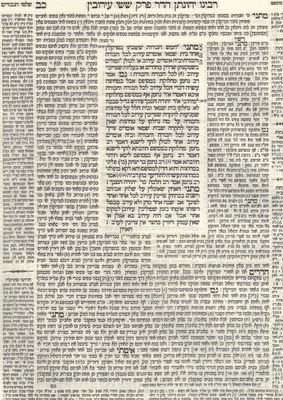
HIDE/SHOW IMAGE
22a
{Eruvin 72a continues}
Mishna:
If five parties spent the Shabbat in one teraklin. {=a large hall divided by partitions that do not reach the ceiling; each party lodges in its own partitioned-off area, each one having an opening to the courtyard}
Bet Shammai say: An eruv for each and every party.
and Bet Hillel say: One {encompassing} eruv for all of them.
And they {=Bet Hillel} agree that when some of them are dwelling in rooms or in the upper chambers, that they require an eruv for each and every party.
Gemara:
Rav Nachman said: The dispute is only when the partition is made of stakes, but in a good partition of ten handbreadths, all would say "An eruv for each and every party."
Some say, Rav Nachman said: Even when the partition is made of stakes is the dispute.
{Eruvin 72b}
An Objection was raised {from a brayta}: Rabbi Yehuda HaSabbach - to explain, the net weaver - Bet Shammai and Bet Hillel do not argue about partitions that reach the ceiling, that we need an eruv for each and every party. On what do they argue? On partitions that do not reach the ceiling. For Bet Shammai say that an eruv is required for each and every party. And Bet Hillel say: One {encompassing} eruv for them all.
According to the version in which Rav Nachman said that the dispute is only when the partition is made of stakes, this {brayta} is a valid disproof.
According to the version in which Rav Nachman said that the dispute is even when the partition is made of stakes, shall we say that this is a valid disproof?
Rav Nachman bar Yitzchak said {our gemara: Rav Nachman can answer you}: When do they argue? By partitions {that do not reach the ceiling}, and the same is true by stakes. And the reason that {in the Mishna} the dispute was stated in terms of partitions of ten handbreadths is to teach you the force of Bet Hillel's opinion.
Rav Nachman cited Rav: The halacha is like Rabbi Yehuda HaSabbach.
Mishna:
Brothers who are partners, who eat at their father's table and sleep in their {own} houses, require an eruv for each and everyone. Therefore, if one of them forgot and did not make an eruv, he renounces his right. When? When they carry their eruv to another place; but if the eruv came to them, or there are no dwellers with them in the courtyard, they do not need to make an eruv.
It's been a while...
-
I've been blogging a bit on Substack, at Scribal Error. While focused more
on gemara and girsaot, I just had a post on Rationalism and Midrash. Check
ou...
3 years ago



No comments:
Post a Comment